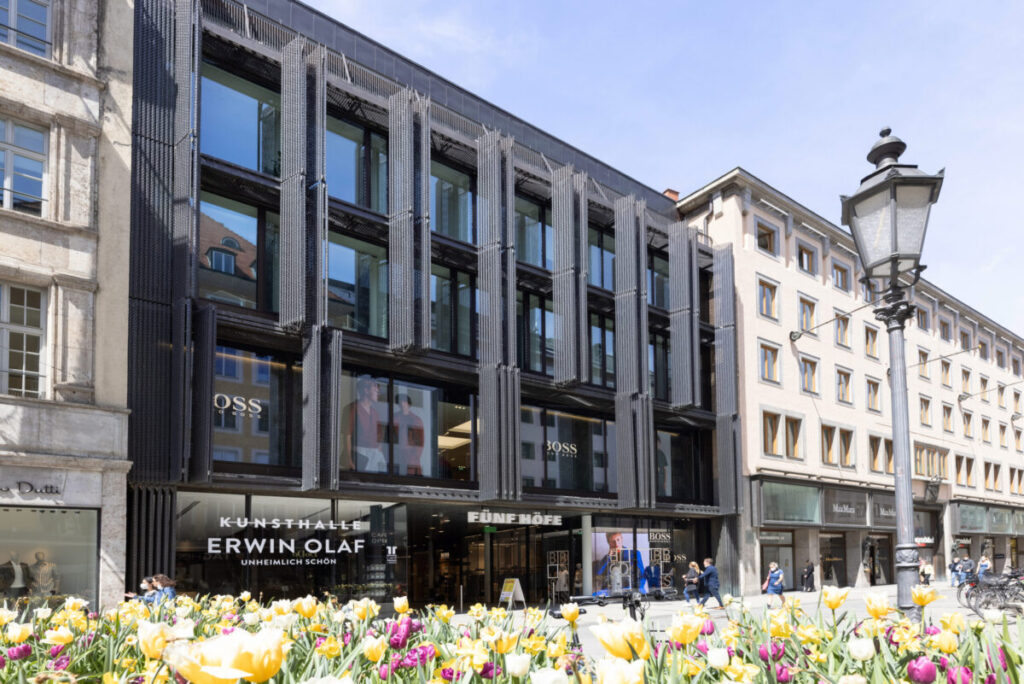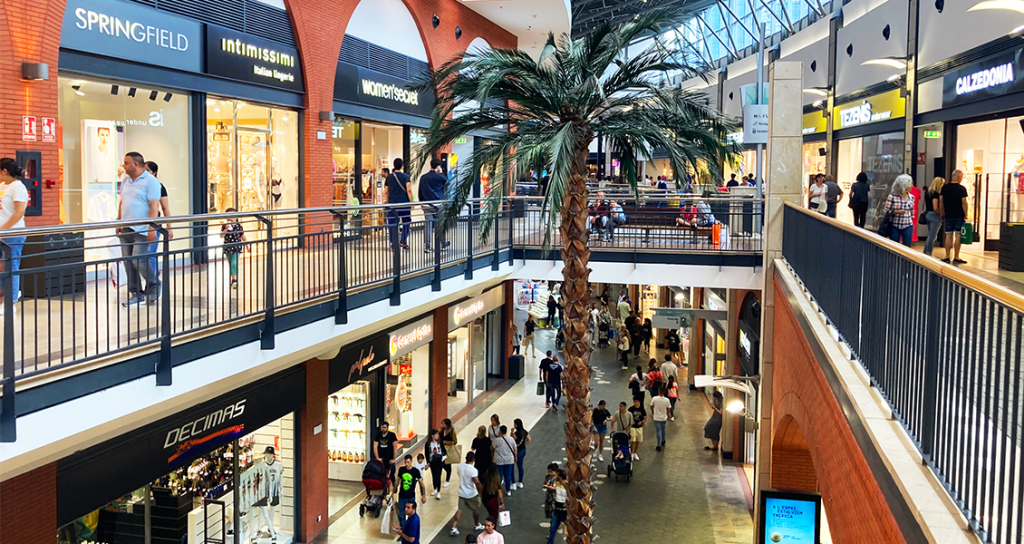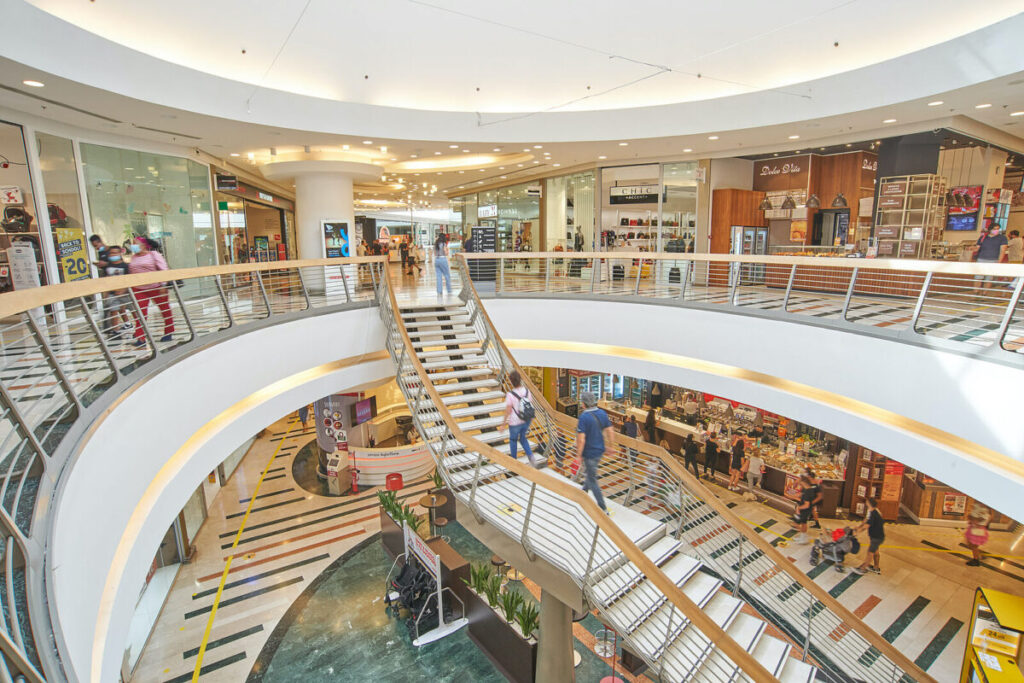ACROSS: ambas celebrated its 10th anniversary in 2024. What were the highlights of that anniversary year?
Steffen Hofmann: For us, the biggest highlight was, indeed, the widespread positive response to our anniversary. It is not about the sheer number of years, but what has been accomplished together by the team for our clients. We were overwhelmed by the positive feedback from business partners, customers, competitors, and long-time companions. 2024 was a good year for the company, which we see as confirmation that we are on the right track in terms of our strategy. We took a significant step forward in the internationalization of our business activities. Our focus is on Germany. However, we have been active in 12 countries since our foundation. In 2024, ambas advised on projects in six different European countries. The team delivered some exciting transactions in the field of shopping centers, designer outlet malls, and in the high-street retail sector. Our company’s field of activity ranged from straightforward property transactions to complex share deals and corporate M&A.

ACROSS: Which transaction were you particularly proud of?
Hofmann: We can’t discuss all projects, but one remarkable transaction we worked on in 2024 was certainly the sale of ROS Retail Outlet Shopping to FREY. Supporting two great companies in the formation of their partnership was a great mission. It was also fascinating to see how such a strategic takeover could impact the competitive landscape in a sector with respect to the future. A second project worth mentioning is the successful sale of Espai Gironès from Commerz Real to Lighthouse. That center, located north of Barcelona, was sold for just under 170 million euros, making it one of the Iberian market’s most significant shopping center deals in 2024. Both transactions mentioned were outside of Germany and involved very international capital partners.
ACROSS: This demonstrates your expertise and is encouraging for 2025.
Hofmann: Absolutely. Regardless of our own trajectory, I am encouraged by recent market evolutions in the area of real estate as an asset class – especially for retail real estate. Interest rates have lowered, while acquisition yields have reached a peak. Prime rents have bottomed out, and collection rates in retail don’t have to hide behind any other real estate sector, except, perhaps, for residential. The outlook for a wider market recovery in the next cycle is positive. With the current yield spread between government bonds and retail real estate, this setting should make the asset class look very attractive to financial real estate investors, in particular, when they have the right operators by their side.

ACROSS: What drivers have revived the transaction market apart from the interest rate level?
Hofmann: At the beginning of last year, I told ACROSS Magazine that we would see the gradual resurgence of the retail transaction markets from the second half of 2024 on. That has proven to be true. Fundamentally, the conditions of the debt-financing market have improved in two respects. Firstly, swap rates have come down to a moderate level, and secondly, lenders have formed a much more positive view of retail real estate. That’s not only true for debt funds and expensive mezzanine lenders, but even conservative senior lenders are returning to the sector. During the next phase, we expect lenders to compete for margins within reason, which would help to further reduce the overall costs of debt. These are two crucial drivers. However, securing debt-finance for large-scale transactions with investment volumes of 150 million euros or more still takes longer than in previous cycles.
ACROSS: Does that mean that we can only expect smaller transactions this year?
Not necessarily. As a matter of fact, 2024 saw some pretty impressive retail deals. Union Investment, for instance, sold the Fünf Höfe in Munich to the Athos family office at a reported deal volume of around 700 million euros, which was a huge transaction. Unibail-Rodamco-Westfield disposed of the Pasing Arcaden shopping center in Munich to Ingka Centres for just under 400 million euros. As already mentioned, our team sold Espais Gironès to Lighthouse for Commerz Real. Klepierre picked up the RomaEst shopping center from GIC in Rome – another transaction worth more than 200 million euros. Nepi Rockcastle bought two prime shopping malls in the CEE market from Union Investment and PIMCO in Poland. Both transactions were worth over 400 million euros. Just before Christmas, Redevco acquired a British retail park portfolio from Oxford Properties worth around 600 million euros. In short, a lot happened in retail in 2024.
ACROSS: What has changed in the perception of the retail property asset class on the investor side?
Hofmann: One realization stands out: Retail real estate is back on the menu and continues to qualify as a significant portfolio component in the portfolio of institutional real estate investors. Even very large assets have proven eligible for transactions in what was considered to be a rather challenging investment market environment. Interestingly, the above transactions are geographically spread across Germany, Spain, Italy, Poland, and the UK – which, in a way, also suggests that the asset class is rated as appealing across different regions.
ACROSS: What does that mean for fund management?
Hofmann: In a season where other asset classes, such as the office sector, have also started to undergo their own phase of structural change, good retail properties keep proving their resilience in many places and continue to convince with solid, in some cases, even impressive, KPIs. The international fund management industry seems to be paying attention to this fact, especially when deciding on new allocations. The risk-return profile is deemed attractive. On the defensive side of fund management, being able to dispose of a large retail asset in such a market frees up a lot of liquidity in one go, which can be deployed elsewhere. It gives you options.
ACROSS: What is your general assessment of the state of the German retail real estate market?
Hofmann: Since the summer of 2024, we have noticed rapidly growing interest through many inbound inquiries from foreign investors coming from the US, the UK, the Middle East, as well as from some European countries, such as France and the Netherlands. These groups have examined historical data and consider the current yield profile for retail properties in Germany to be really interesting. They have also gathered that some traditional domestic core buyers may not be in a position to move with their usual pace and clout. Indeed, there seems to be a window of opportunity for new market entrants to get their hands on pipeline opportunities that would be pretty difficult to access in other seasons.


ACROSS: On the leasing side, two trends intensified in 2024: Entertainment concepts moved into large spaces at centers and more discount concepts opened. Both pay comparatively low rents. What is your assessment of this situation from an investor’s perspective?
Hofmann: Those are two very different issues.Leisure and entertainment concepts can have synergies with surrounding retail uses, present solutions to prevent structural vacancies, and help attract new customer groups. Shaping truly attractive entertainment destinations requires expertise – and, if of a decent size and quality, meaningful financial commitments as well. More often than not, such ventures are a little experimental. Rental covenants may not be reassuring, and the tenants tend to prefer shorter leases, or leases with break options just in case the concepts don’t fly. Operational requirements need to be well thought through. Planning permits and restrictions on operating hours can interfere with the business model of the operator. Once successfully established, the asset profile will benefit from a valuable USP.
ACROSS: What is the situation with discount concepts?
Hofmann: The situation is different for some expanding food, fashion, and department store discount concepts, for instance. They follow different expansion logic. Those concepts find it challenging to maintain their aggressive price levels through online distribution, because online retail is costly and usually a loss-maker for such concepts. Due to optimized value chains and efficient store operation, such discount concepts can run very profitable physical store operations. These players are usually keen to penetrate a market and benefit from economies of scale. They are interested in securing locations for long periods and are, therefore, willing to conclude long-term leases. The credit rating is strong. The risk of defaulting on rent payments is much lower. In many aspects, such concepts are an easier choice.
ACROSS: What does that mean for the long-term image of a location?
Hofmann: Nothing drags a shopping atmosphere down more than a permanent void. Clearly, those who have the choice between different occupiers, should not undermine their own positioning. The arrival of discount stores, the emergence of entertainment concepts, and the increased mixed-use orientation has, indeed, had an impact on the profiles of locations. The core task of a skilled shopping center manager is to put an offer mix together that caters to the relevant catchment area and suits his or her target groups. Retailers, in turn, are free to decide in which environment they wish to sell their products and showcase their brands. They have a wide choice nowadays. Certain premium brands may simply not accept discount retailers settling within 100 meters walking distance to their own units, or on the same trading floor, to avoid negative spillover-effects on their image. Through the right clustering approach within the asset, a trading down effect can often be prevented. Shopfronts of modern discount stores can look surprisingly appealing.
ACROSS: Unlike the shopping center industry, the outlet sector does not have vacancies or rights issues. On the contrary, it continues to show enormous momentum.
Hofmann: The outlet sector is fascinating and has a different trajectory from more traditional shopping formats. It’s a niche sector with a few players that dominate the ecosystem. Footfall and sales show that European shoppers have learned to integrate a couple of outlet mall shopping days into their calendars. Customers are willing to travel further distances to get to them. Some premium outlets have been expanded several times due to their enormous success.However, there are limits when it comes to developing new projects – not only from a planning law perspective; there is also tough competition in that area. Working with specialized operators is even more important than in other sub-sectors. Brand mix is key. Deep marketing pockets are a necessity. Income streams have dynamic components, which are more difficult to grasp for outsiders.
ACROSS: Well, we have covered a lot today, haven’t we? And, there is still so much more for good consultants to do. In conclusion, what are ambas’ plans for 2025?
Hofmann: We are committed to continuity. The business formula will remain the same, and we will remain available to our market partners for independent sector specialist advice. The company’s track record is strong. We love what we do, and we are going to expand our team further as we are convinced that the market is moving in our favor.

Steffen Hofmann
Steffen Hofmann is a Managing Partner at ambas






